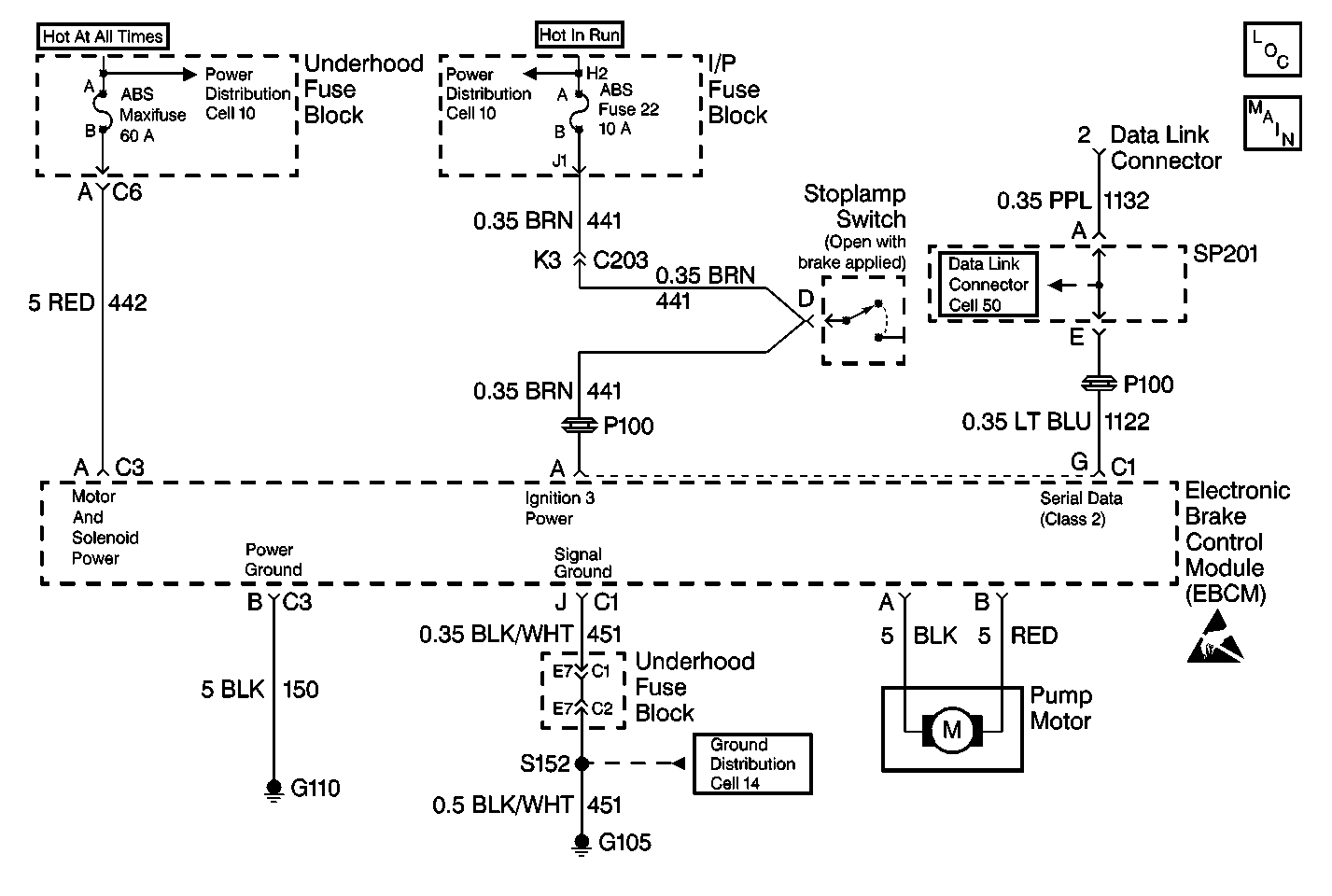
Circuit Description
The pump motor circuit is integral to the BPMV. The EBCM microprocessor energizes a relay within the EBCM in order to supply battery voltage to the high side of the pump motor. The EBCM microprocessor grounds the low side of the pump motor when activation of the pump motor is required.
Conditions for Setting the DTC (C0267)
| • | The EBCM internal relay is on |
| • | The pump motor is off |
| • | Low voltage is present from the low side of the pump motor when high voltage is expected |
Conditions for Setting the DTC (C0268)
| • | Vehicle speed is 13 km/h (8 mph) |
| • | The EBCM internal relay is on |
| • | The pump motor is commanded ON and then OFF |
| • | High voltage exists from the low side of the pump motor for 100 ms when the voltage is expected to be low |
Action Taken When the DTC Sets
| • | The ABS indicator lamp turns on |
| • | The ABS disables |
DTCs C0267-C0268 are ignition latched DTCs, which indicates that the above actions remain true until the ignition switch is turned to OFF (even if the cause of the DTC is intermittent).
DTCs C0267/C0268 are DRP Non Critical malfunctions. If another DTC sets before this DTC is investigated and cleared, this will become a DRP Critical malfunction and the BRAKE indicator lamp will also turn on.
Conditions for Clearing the DTC
| • | Repair the conditions responsible for setting the DTC. |
| • | Use the Scan Tool Clear DTCs function. |
Diagnostic Aids
The pump motor is integral with the BPMV. Do not service the pump motor separately. A poor power/ground connection at the 2-way EBCM connector or the 2-way motor harness from the EBCM to the pump motor can cause a DTC C0267. A seized pump motor, shorted pump motor windings or a poor power/ground at the 2-way EBCM connector can cause a DTC C0268. Replace the EBCM or the BPMV if the following tests show that the pump motor EBCM internal circuits have failed.
Important: Reset the J 39200 test leads to zero prior to making any resistance measurements. Refer to the J 39200 in the user's manual.
Test Description
The numbers below refer to the steps in the diagnostic table:
-
This step checks for an open pump motor circuit. The pump motor circuit resistance should not be above the 0.5 ohms. Reset the J 39200 test leads to zero prior to making this measurement.
-
This step determines the resistance of the EBCM ground circuit.
-
This step determines the ignition voltage available to the EBCM.
Step | Action | Value(s) | Yes | No |
|---|---|---|---|---|
1 | Was the Diagnostic System Check performed? | -- | Go to Step 2 | |
2 |
Is the connector and the wiring in good condition? | -- | Go to Step 3 | Go to Step 10 |
Is the resistance within the specified range? | 0.1-0.5ohms | Go to Step 4 | Go to Step 15 | |
4 |
Is the connector in good condition? | -- | Go to Step 5 | Go to Step 9 |
Measure the resistance between terminal B of the 2-way EBCM harness connector and the ground using a J 39200 . Is the resistance within the specified range? | 0-2ohms | Go to Step 6 | Go to Step 11 | |
6 |
Is the voltage equal to or greater than the specified value? | 10.0 V | Go to Step 8 | Go to Step 7 |
Inspect the 60 A MaxiFuse® in CKT 442. Is the MaxiFuse® open? | -- | Go to Step 13 | Go to Step 14 | |
8 |
Does the DTC set as a current DTC? | -- | Go to Step 12 | Malfunction is intermittent. Go to Diagnostic Aids |
9 | Repair the 2-way EBCM harness connector if necessary. Refer to Connector Repairs . Is the repair complete? | -- | -- | |
10 | Repair the 2-way pump motor pigtail connector or wiring if necessary. Refer to Connector Repairs . Is the repair complete? | -- | -- | |
11 | Repair the open or the high resistance in the CKT 150. Is the repair complete? | -- | -- | |
12 | Replace the EBCM. Refer to Electronic Brake Control Module Replacement . Is the repair complete? | -- | -- | |
13 | Repair short to ground in CKT 442. Is the repair complete? | -- | -- | |
14 | Repair the open or the high resistance in CKT 442. Is the repair complete? | -- | -- | |
15 | Replace the BPMV. Refer to Brake Pressure Modulator Valve Replacement . Is the repair complete? | -- | -- |
